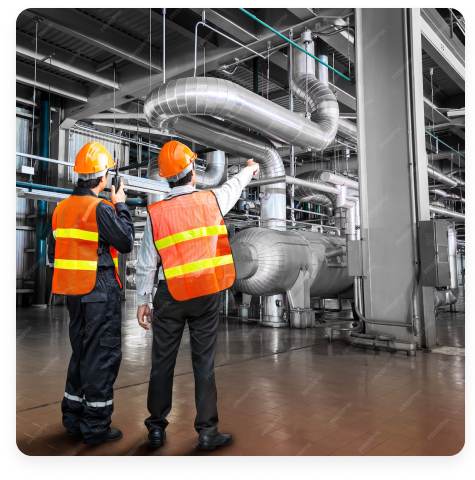Water Flooding Management
5-day course overviews water flooding management techniques, essential knowledge & strategy to enhance oil recovery. Malaysia - Indonesia training based
Level
Basic
Type
Facetoface

Trusted by Leading Companies
Our training programs are promoted to engineers, supervisors, and technical teams across the globe, supporting their continuous development and operational competency.












About Training
This course is designed to ensure an effective understanding of the water flooding (injection) system as one of the reservoir secondary methods of oil recovery and maintain the reservoir pressure with special attention to the system components from the supply source to the injection point in the reservoir. It involves injecting clean, non-corrosive water into the reservoir to displace the remaining oil. This training course is primarily on the mechanics of oil recovery by water flooding. The aim of this course is to provide the participants with a complete and up-to-date overview of water flooding. Upon successful completion of this training course, participants should have a solid grounding in understanding the purpose, operation, and inspection of water injection systems for enhanced oil recovery. The training course will also illustrate potential problems and solutions.
The course is composed of modules, which include exercises, group discussions, and quizzes for full comprehension of the course topics relevant to all functions of the water injection system and its operations.
Training Objectives
What is Water Flooding Management training course objective?
- Apply and gain in-depth knowledge on water injection technology and determine the water flooding process as a major method of Enhanced Oil Recovery (EOR).
- Familiarize with the water injection actual field operations.
- Understand the relation between water injection & reservoir pressure maintenance.
- Introduce the basic knowledge of the operating fundamentals of the system.
- Acquire a fundamental knowledge of the water injection well construction.
- Understand the basic water injection quality control and monitoring.
- Gain experience in the system problems and troubleshooting.
- Understand what are the factors affecting successful institution of waterflooding.
- Understand how to design, predict and monitor waterflooding.
- Learn various diagnostics & quantitative techniques of waterflood surveillance and balancing.
- Learn special considerations of waterflooding remediation of excessive water production shutoff, improving sweep efficiency, polymer augmented waterflood, low salinity) waterflood and reservoir souring.
- Distinguish the influence of the reservoir and fluid characteristics on injection process and determine the relation between reservoir engineering data and injected water (displacement).
- Demonstrate understanding of the principals involved in pressure maintenance & oil displacement by an injected fluid.
- Explain the functions of water injection systems through filters and deaeration and identify the various types of filters.
- Detail the different qualities of seawater corrosion and distinguish the relationship of microbiological growth and corrosion in line with the structure and growth of diatoms, bacteria and algae.
- Apply the several tests used to evaluate water quality including process of collecting samples, transport of samples and test frequencies for particle counts.
- Discuss the thermal methods ofEOR including hot water and steam injection and get important tips of the polymer injection process.
Audiences
Who should join Water Flooding Management training course by PetroSync?
- Operations Engineers with 0-10 Years Experience
- Operations Supervisors with 0-10 Years Experience
- Production Engineers with 0-10 Years Experience
- Petroleum Engineers with 0-10 Years Experience
- Reservoir Engineers with 0-10 Years Experience
- Field Services Engineers with 0-10 Years Experience
Instructor
ME
Magdi El Naggar
Magdi El Naggar is officially Certified as Professional Petroleum Engineering Consultants (License 116/7). He has 46 years of professional experience n various phases of Petroleum Engineering including Petroleum/Reservoir/Production/Drilling & Workover Engineering as well as field operations with several multi-national international companies including ARAMCO (Saudi Arabia) and ADNOC (UAE). He has extensive professional experiences in all phases of well intervention operations including coiled tubing, especially during well emergency cases, well control and extended reach operations.
He specialized in well intervention operations, especially, during emergency cases and well blowouts. He also has extensive experiences in full field development studies, Production Enhancement for oil fields as well as various types of wells, CO2 Injection and EOR operations, IWCF & IADC certification.
Daily Aims
DAY 1 - Introduction
Pre-Course TestModule 1 : Reservoirs and Rock Properties
- Definition of Reservoir
- Reservoir Characteristics (Porosity, Permeability, Reservoir Pressure, Reservoir Temperature, Formation Damage, etc)
- Factors affecting Reservoir Flow
- Super-Saturated Reservoir
- Reservoir rock properties
- Reservoir fluids properties
- Factors affecting water flooding
Module 2 : Introduction to Water Injection
- Definition of Water Injection
- Reasons for Water Injection
- Reservoir Drive Mechanisms
Module 3: Waterflooding
- Waterflooding definition, concept and objective
- Water flooding Vs. Water injection
- Types of waterflood patterns
- Sources of injection water
- Factors affect water flow process
- Waterflooding advantages
- Case Study:
- Water injection patterns
- Aquifer water Vs. seawater
- Injection water quality control
DAY 2
Quizzes & recap
Module 4: Water Injection Systems
- Main components of a water injection system
- Types of pumps in water injection system
- Purpose of pumps
- Filtration of water
- Purpose of injection well manifolds
- Case Study:
- Water injection system components
- Y-tool applications in water injection system
- Selection criteria of the water injection system
Module 5 : Screening for Water Flooding
- Drive Mechanism
- Reserves estimate and remaining reserves
- Reasons for waterflooding
- Secondary recovery and pressure maintenance concept
- Reservoir engineering aspects and screening for water flooding
- Water injection systems
- Water source: produced water, aquifer water, seawater
- Basic water treatment
- Basic seawater treatment
- Filtration & deaeration
- Group discussion and exercises
DAY 3
Quizzes & recapModule 6: Design Aspects of Water Injection Well System
- Reservoir considerations
- Immiscible displacement theory
- Water injection wells construction
- Basic well completion
- Types of water injection wells
- Operating parameters of wells
- Water flood performance efficiency
- Water flood design
- Candidate, pattern and factors affecting pattern selection and well spacing
- Water flood production performance and reservoir forecast
- Factors influencing water flood recovery
- Water flood monitoring
- Group discussion and exercises
Module 7: Water Flooding Quality & Monitoring
- Quality & monitoring
- Corrosion problems (reasons and solutions)
- Field operations, water system compatibility and treatment
- Introduction to chemical enhanced oil recovery techniques
- Polymer flooding
- Group discussion and recap
DAY 4
Quizzes & recapModule 8: Enhanced Oil Recovery (EOR) Applications
- Surfactant flooding
- Alkaline flooding
- Hot water flooding
- Steam injection
- Water flood project optimization and economic evaluation
- Field examples and case hist
Module 9 : Injection Water Impurities
- Water supply sources for injection water
- Aquifer water, impurities and quality control
- Seawater, impurities and quality control
- Scaling problem
- Fill accumulation problem
- Importance of water source compatibility
- Group discussion and exercises
Module 10 : Water Treatment
- Types of produced water
- Aquifer water treatment
- De-oxygenation
- Reasons for treating injection water
- Subsea water injection treatment
- Biological activities of bacterial colonies
- Types of bacteria causes reservoir souring and process mechanism
- Case Study:
- 3 case studies by participants
DAY 5
Module 11: Water Quality Monitoring- Requirement for water quality monitoring
- Principle of particle size analysis
- Turbidity
- Different types of testing methods
Module 12: Operations of the Water Injection System
- Water injection methodologies
- Key operating parameters of the water injection system
- Water performance calculation (Injection water volume calculations)
Module 13: Reservoir Souring
- Mechanisms of souring
- Sulphate Reducing Bacteria
- Reduction of SRB Protection by Bisulphite
- Chemicals
- Thermal Sulphate Reduction
- Mineral Solubility
- Partitioning of H2S
- Reservoir souring reasons
- Types of bacteria causing reservoir souring
- Factors influencing reservoir souring process
- Impact of souring on reservoir performance
- Factors affecting reservoir souring
- Reservoir souring treatment process and techniques
- Mitigation
- H2S Scavengers
- Biocide Treatments
- Nitrate Treatments
- Sulphate Removal from Injection Water
- Reservoir Souring Prediction
- Modelling Capabilities
- Uncertainties
- Post-course Test
Training Schedule
Why Choose This Training
Credibility
Align with API/ASME standards. Trusted by major operators.
Expert Instructors
Led by industry veterans with real field experience.
Real Case Studies
Practical application of concepts through real world scenarios.
Practical Skills
Hands on calculations and decision making for FFS outcomes.
Trusted by Operators
Delivered to Aramco, ADNOC, SABIC, and other major operators.
Global Training Standard
Recognized across major industries by PetroSync's proven approach.
Professional Training Aligned with Industry Standards
Practical, industry ready training designed for real work environments
Limited seats available

Frequently Asked Questions
-
Direct Transfer
PetroSync Global Pte Ltd Bank Details:
- Account Name: PetroSync Global Pte Ltd
- Bank Name: DBS Bank Ltd
- Bank Code: 7171
- Bank Swift Code: DBSSSGSGXXX
- Branch Code: 288
- Account No: 0288-002682-01-6-022 (USD)
- Bank Address: 12 Marina Boulevard, Level 3, Marina Bay Financial Centre Tower 3, Singapore 018982
-
Terms & Conditions:
- For payment via direct telegraphic transfer, clients must bear both local and overseas bank charges.
-
Credit Card:
Terms & Conditions:
- A 4% credit card processing fee applies for credit card payments.
- Delegates who cancel after the training has been officially confirmed via email are required to pay the full course fee, and no refunds will be granted. However, you may substitute delegates at any time as long as reasonable advance notice is given to PetroSync.
- If PetroSync cancels, postpones, changes the trainer, or alters the training location (classroom/virtual) for any reason, and the delegate is unable or unwilling to attend on the rescheduled date, a 100% credit voucher of the paid contract fee will be issued. This credit voucher can be used for another PetroSync training program, subject to mutual agreement, within one year from the postponement date.
- PetroSync is not responsible for any loss or damage resulting from the cancellation policy and assumes no liability if the event is canceled, rescheduled, or postponed due to force majeure (e.g., natural disasters, war, government actions, industrial actions).
If PetroSync cancels, postpones, changes the trainer, or alters the training location (classroom/virtual) for any reason, and the delegate is unable or unwilling to attend on the rescheduled date, a 100% credit voucher of the paid contract fee will be issued. This credit voucher can be used for another PetroSync training program, subject to mutual agreement, within one year from the postponement date.
Yes, participants who complete the training will receive either an attendance certificate or a completion certificate, depending on the course requirements.
Yes, PetroSync courses adhere to international standards , with expert instructors in fields such as API, ASME, Reliability, and Drilling & Well Engineering.
Yes, PetroSync certificates are widely recognized and can be used to fulfill professional development and certification requirements across various industries.
Yes, PetroSync offers customized training programs tailored to your organization's specific needs (In-house Training).
Participants will receive comprehensive training materials , including slides, handouts, and direct learning from experts with case studies related to the training topic.
PetroSync trainers are industry experts with extensive experience as instructors and consultants in their respective fields, providing professional training with a strong background in the industry.
Yes, trainer profiles, including their qualifications, experience, and expertise, are available on the website: https://www.petrosync.com/training/.
Online training sessions are conducted via user-friendly platforms such as Zoom Premium.
To access PetroSync Online Training, participants need:
- A computer or laptop (tablets or smartphones are not recommended)
- A reliable broadband internet connection (minimum 4 Mbps)
- A webcam and a headset
- Any internet browser (Chrome browser recommended for a better experience)
- A reasonably quiet place
Yes, PetroSync provides live Q&A sessions with instructors to address real-world challenges encountered during training.
The average number of participants varies depending on the topic and participants’ schedules.
- The information you provide will be safeguarded by PetroSync and may be used to keep you informed of relevant products and services.
- As an international group, we may transfer your data globally for the purposes indicated above.
- If you do not wish to share your information with other reputable companies, please tick the box on the registration form.
Please fill out the form on the designated page first. Our team will reach out to you within a maximum of 2x24 hours.
The latest training schedule is available on the website: https://www.petrosync.com/training/.
